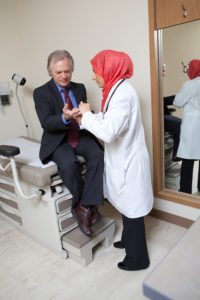
It’s true, growing older comes with some undesirable side effects, and for many of us that includes aching joints. Arthritis, or joint pain, is one of the most common conditions in the U.S., costing more in treatment than all cancers combined. But not all arthritis is the same. There are more than 100 different kinds of arthritis and rheumatic diseases, but almost all of them can be classified into two groups: inflammatory and non-inflammatory. And, surprise, arthritis can affect young people, too.
In the non-inflammatory arthritis category, the most common type is called osteoarthritis or degenerative arthritis. This is caused by “wear and tear” of your joints or the “mileage you put on your joints,” which is why it is usually seen in adults over 50 but also can be seen in young people who put considerable strain on their joints, such as athletes. If your pain gets worse as the day goes on, or with repetitive use, that usually points to degenerative arthritis. The most common joints affected by this type of arthritis are the knees, hips, lower back and the base of the thumbs. Blood work is usually normal in osteoarthritis, but a proper physical examination and X-rays can help make the diagnosis.
If your pain is worse in the morning with stiffness lasting for hours, and then improves as you are active, that may indicate you have an inflammatory arthritis. There are more than 30 types of inflammatory arthritis, and among these, rheumatoid arthritis (RA) is the most common (affecting 1 in 100 people). RA can be diagnosed at age 2 or 80, but the peak incidence is between 30 to 40 years of age. The cause of RA is unknown, but known risk factors include genetics (if you have a family history of RA, then you are at higher risk), tobacco use and female gender (the condition is four times more common in women). Rheumatoid arthritis is particularly common in the small joints (like fingers and wrists). It will usually be symmetrical, meaning pain in both shoulders or both hands. It is often accompanied by joint swelling, sometimes a rash, or excessive fatigue and low-grade fever.
Other common types of inflammatory arthritis include psoriatic arthritis (if you have skin psoriasis, you have a 30 percent likelihood of getting the arthritis associated with it), lupus arthritis and gout. Inflammatory arthritis is more concerning because it is autoimmune and, if severe, can affect other organs in the body. Furthermore, if inflammatory arthritis is not detected and treated early, it can lead to permanent joint damage, which is why it is important to discuss your symptoms with your primary care physician, who can assess the need for referral to a rheumatologist.
The basic management of joint pain in both inflammatory and non-inflammatory arthritis is the same – your physician might recommend physical therapy, braces, joint injections and may also advise weight loss, a graded exercise regimen, yoga and acupuncture – all of which have proven to show improvement in arthritic pain. Studies also have shown that making good lifestyle choices such as reducing stress levels, practicing positive thinking, eating a healthy balanced diet, not smoking, avoiding excessive red meat and alcohol intake (especially with gout), and keeping active help control arthritic pain.
General medications for all arthritis include short courses of anti-inflammatories and pain relievers such as acetaminophen or ibuprofen. Although there is no cure for arthritis, there are dozens of FDA-approved immunologic medications for rheumatoid and psoriatic arthritis that reduce inflammation and prevent joint damage, especially if used early in diagnosis.
If you have joint pain that lasts for more than a month, involves multiple joints and often comes with swelling, redness or fatigue, you may be developing an inflammatory arthritis and should be referred to a rheumatologist.
As we age, we expect certain changes in our bodies. However, pain is never something that should be brushed off. By getting your doctor involved early, you can get speedy treatment that can protect your quality of life for years to come.
UCF Health is the College of Medicine’s physician practice, offering primary and specialty care to the community. Its newest office is located in Lake Nona at the corner of Narcoossee Road and Tavistock Lakes Boulevard. Most major insurance plans are accepted. Visit UCFHealth.com for more information, or call (407) 266-DOCS to schedule an appointment.


